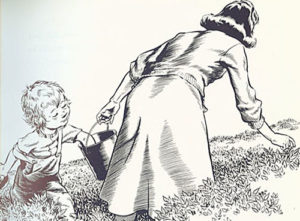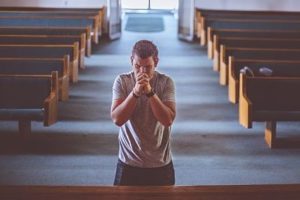
Covid-19 and the Meaning of Work: A Theology of the Body Perspective
March 27, 2020
 Sadly, 3.5 million Americans have already filed for unemployment as the economic consequences of the Coronavirus pandemic escalate. We pray for them and their families. Many others have had their work lives altered by “social distancing” protocols: virtual team meetings via Zoom or Skype have rapidly become the “new normal.” “Coronavirus will permanently change how we work,” proclaimed a Wall Street Journal editorial last week.
Sadly, 3.5 million Americans have already filed for unemployment as the economic consequences of the Coronavirus pandemic escalate. We pray for them and their families. Many others have had their work lives altered by “social distancing” protocols: virtual team meetings via Zoom or Skype have rapidly become the “new normal.” “Coronavirus will permanently change how we work,” proclaimed a Wall Street Journal editorial last week.
In all of this social dislocation and suffering, let us recall that as Catholic Christians we are in the world but not of it. (John 17:6). Let us also at this time reflect on what we might constructively do for the common good, which means reflecting on the nature of work itself from the biblical worldview.
Our Ruah Woods Press ROOTED K-12 Theology of the Body Curriculum does just that. Mined from the Christian anthropology of Genesis 1-3, it provides families, teachers and students beautiful, practical lessons from some of the most honored and enduring children’s books ever published. Rooted takes us back to the words of Christ, who reminds us that “from the beginning” God gifts us with a capacity to love, to partner, to create and to work as a means to finding our own happiness serving the common good. (Matthew 19:18).
ROOTED’s Kindergarten study centers in part on Robert McCloskey’s Caldicott-award winning book “Blueberries for Sal.” In the humble work of mother and daughter providing for their family, we see the “gift dimension” hidden in their work. Far from being a curse on them, their work mysteriously raises their own, and our, awareness that they are set apart from the rest of creation. The lesson plans help us plan specific times in the Church year to teach this lesson to one’s family and friends, such as the upcoming Feast of St Joseph the Worker (May 1st) , or on Mother’s Day.
humble work of mother and daughter providing for their family, we see the “gift dimension” hidden in their work. Far from being a curse on them, their work mysteriously raises their own, and our, awareness that they are set apart from the rest of creation. The lesson plans help us plan specific times in the Church year to teach this lesson to one’s family and friends, such as the upcoming Feast of St Joseph the Worker (May 1st) , or on Mother’s Day.
ROOTED and its unique, underlying vision of the human person is predicated on a spirituality of work. Pope St. John Paul the Great knew from his own personal experience the “depth dimension” of human work, and came to see in the biblical record that work, rightly aligned to the Creator, is itself a gift from God. Catholic theology reminds us that our very lives are themselves an “external work” of the Holy Trinity, which means we originate from and share in the “eternal exchange of love” that is the Father, Son and Holy Spirit (CCC 221). Work for the Christian is a “gift within the gift” of vocation God has entrusted to each of us. Work can and often does lead us closer to our Creator.
Theology of the Body reminds us that this spirituality of work predates the Fall. Adam and Eve were gifted with a dignity and honor unique amongst all living things: their capacity to name the animals (Gen. 2:20). In this they share in and extend God’s logos, his creating and ordering reality; in naming they understand, order and classify reality. When they tragically choose to misuse their freedom and disobeyed God’s plan, their work became difficult—but it did not lose its basic dignity and goodness.
In his great encyclical of 1981, Laborem Exercens, St. John Paul II argued that this “adequate understanding” of the meaning of work is “the essential key” to the social question, to the just ordering of society. (LE 3)
 Work for him contains two dimensions or “senses.” The first, which most of us focus on exclusively, is the “objective dimension”— the things we create, the tasks, goods and services that we provide. But there is another dimension to work: the “subjective dimension.” This is the spirituality of work, what it does to the worker, how it makes him or her more (or less) by participation in the process of creating and doing. John Paul II argues that it is this dimension which is, in fact, the most important. It is from an awareness of this dimension that the vitality and justice of a free economy is born. New ideas and technologies are discovered via the subjective dimension of work, often entrepreneurially by a team of workers trying to invent a better way of doing things (LE 5,6).
Work for him contains two dimensions or “senses.” The first, which most of us focus on exclusively, is the “objective dimension”— the things we create, the tasks, goods and services that we provide. But there is another dimension to work: the “subjective dimension.” This is the spirituality of work, what it does to the worker, how it makes him or her more (or less) by participation in the process of creating and doing. John Paul II argues that it is this dimension which is, in fact, the most important. It is from an awareness of this dimension that the vitality and justice of a free economy is born. New ideas and technologies are discovered via the subjective dimension of work, often entrepreneurially by a team of workers trying to invent a better way of doing things (LE 5,6).
The Coronavirus 19 crisis presents us with both dangers and opportunities. In light of this richly biblical vision of the human person, let us not lose heart or trust that Christ promises to be with us always, until the end of time. (Matt 28:20) There is a temptation, in times like these, to try to take control over things we cannot control. This can arise from a practical atheism. Biblical faith, by contrast, inspires us to do all we can, in cooperation with the Holy Spirit, trusting that our life is in God’s hands.
In this lens, let us remember that throughout human history it was human innovation in the scientific, technological and commercial arenas that contributed, and relieved human suffering. Consider that in recent memory the development of penicillin, a scientific discovery first made in 1928 but that that lay dormant for a decade. No technical capacity existed to isolate the active ingredient and produce enough of it for testing. It was not until President Roosevelt in 1940 assembled and authorized a group of scientists from industry, academia and federal agencies that penicillin was finally mass produced, thereby saving millions of lives.

Let us pray as citizens of this world and the next: “St. John Paul the Great, we thank you for your great teaching, and ask you to intercede for us and our nation and world in this time of great suffering. May the Holy Spirit guide those scientists and technicians working to develop Covid-19 treatments or a vaccine.”
“Man, created in the image of God, in working shares in the activity of the Creator, …in developing his work…he perfects it as he advances in the discovery of the resources and values contained in the whole of creation” (LE, 25).
APPENDIX:
Unpacking the TOB Theme of “DIGNITY OF WORK” recurs progressively at deeper levels in ROOTED: K-12 Theology of the Body Curriculum
KINDERGARTEN: Blueberries for Sal lesson: Human Work
FIRST GRADE: Animal Hedge lesson: Human Work
FOURTH GRADE: Peppe the Lamplighter lesson: Dignity of Work & Gift of Self
EIGHTH GRADE: Vocation and Gift lesson
HIGH SCHOOL: Called to be More Course 7: Living as a Disciple of Jesus Christ, Lesson 6: The Dignity of Work (explore it now with NEW 5-Week FREE Trial Offer)
Written by,
Fr. Tom Wray, Chaplain & Curriculum Consultant
at Ruah Woods Press, frtom@ruahwoods.org
Share